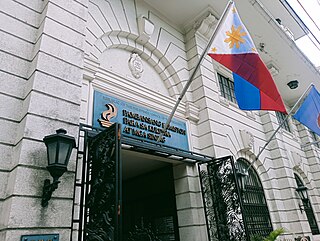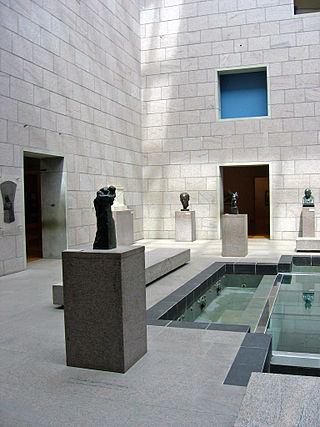
The Department for Culture, Media and Sport (DCMS) is a ministerial department of the Government of the United Kingdom. It holds the responsibility for culture and sport, and some aspects of the media throughout the UK, such as broadcasting. Its main offices are at 100 Parliament Street, occupying part of the building known as Government Offices Great George Street.
The Arts Council of Great Britain was a non-departmental public body dedicated to the promotion of the fine arts in Great Britain. It was divided in 1994 to form the Arts Council of England, the Scottish Arts Council, and the Arts Council of Wales. At the same time the National Lottery was established and these three arts councils, plus the Arts Council of Northern Ireland, became distribution bodies.

Arts Council England is an arm's length non-departmental public body of the Department for Culture, Media and Sport. It is also a registered charity. It was formed in 1994 when the Arts Council of Great Britain was divided into three separate bodies for England, Scotland and Wales. The arts funding system in England underwent considerable reorganisation in 2002 when all of the regional arts boards were subsumed into Arts Council England and became regional offices of the national organisation.

European Union culture policies aim to address and promote the cultural dimension of European integration through relevant legislation and government funding. These policies support the development of cultural activity, education or research conducted by private companies, NGO's and individual initiatives based in the EU working in the fields of cinema and audiovisual, publishing, music and crafts.

A grant is a financial award given by a government entity, foundation, corporation, or other organization to an individual or organization for a specific purpose. Unlike loans, grants do not need to be repaid, making them an attractive source of funding for various activities, such as research, education, public service projects, and business ventures. Examples include student grants, research grants, the Sovereign Grant paid by the UK Treasury to the monarch, and some European Regional Development Fund payments in the European Union.
The Arts Council of New Zealand Toi Aotearoa (Creative New Zealand) is the national arts development agency of the New Zealand government established in 1963. It invests in artists and arts organisations, offering capability building programmes and developing markets and audiences for New Zealand arts domestically and internationally.

The Scottish Government Education Directorates were a group of the civil service directorates in the Scottish Government. The Directorates were titled Children, Young People and Social Care; Schools; and Lifelong Learning. They were responsible for education in Scotland; social work care for children and young people and lifelong learning. In December 2010 these functions were taken on by the Learning and Justice Directorates.

The National Commission for Culture and the Arts of the Philippines is the official government agency for culture in the Philippines. It is the overall policy making body, coordinating, and grants giving agency for the preservation, development and promotion of Philippine arts and culture; an executing agency for the policies it formulates; and task to administering the National Endowment Fund for Culture and the Arts (NEFCA) – fund exclusively for the implementation of culture and arts programs and projects.

Creative Australia, formerly known as the Australia Council for the Arts and the Australia Council, is the country's official arts council, serving as an arts funding and advisory body for the Government of Australia.
Performing arts education in Australia refers to the teaching of different styles of creative activity that are performed publicly. The performing arts in Australia encompasses many disciplines including music, dance, theatre, musical theatre, circus arts and more. Performing arts education in Australia occurs both formally and informally at all levels of education, including in schools, tertiary institutions and other specialist institutions. There is also a growing body of evidence, from the Australian Council for the Arts and the Parliament of Australia, showing that First Nation's participation in the arts and culture has significant economic, social and cultural benefits to Australia and further supports the outcomes of the Australian governments ‘Closing the Gap’ campaign. There has been an increasing number of scholarships opening up in educational institutions for Indigenous Australians aimed at encouraging this participation in the arts.
The Higher Education Funding Council for Wales (HEFCW) was the Welsh Government Sponsored Body responsible for funding the higher education sector. It was replaced by Medr, the Commission for Tertiary Education and Research from August 2024.
The Irish Research Councilwas an associate agency of the Department of Further and Higher Education, Research, Innovation and Science, under the aegis of the Higher Education Authority.

Community education, also known as Community-Based Education or Community Learning & Development, or Development Education is an organization's programs to promote learning and social development work with individuals and groups in their communities using a range of formal and informal methods. A common defining feature is that programmes and activities are developed in dialogue with communities and participants. The purpose of community learning and development is to develop the capacity of individuals and groups of all ages through their actions, the capacity of communities, to improve their quality of life. Central to this is their ability to participate in democratic processes.

Cultural policy is the government actions, laws and programs that regulate, protect, encourage and financially support activities related to the arts and creative sectors, such as painting, sculpture, music, dance, literature, and filmmaking, among others and culture, which may involve activities related to language, heritage and diversity. The idea of cultural policy was developed at UNESCO in the 1960s. Generally, this involves governments setting in place processes, legal classifications, regulations, legislation and institutions which promote and facilitate cultural diversity and creative expressions in a range of art forms and creative activities. Cultural policies vary from one country to another, but generally they aim to improve the accessibility of arts and creative activities to citizens and promote the artistic, musical, ethnic, sociolinguistic, literary and other expressions of all people in a country. In some countries, especially since the 1970s, there is an emphasis on supporting the culture of Indigenous peoples and marginalized communities and ensuring that cultural industries are representative of a country's diverse cultural heritage and ethnic and linguistic demographics.

University Alliance (UA) is an association of British universities formed in 2006 as the Alliance of Non-Aligned Universities, adopting its current name in 2007.
Dame Seona Elizabeth Reid is a Scottish arts administrator who was director of the Glasgow School of Art from 1999 to 2013, and former director of the Scottish Arts Council from 1990 to 1999.

Creative Scotland is the development body for the arts and creative industries in Scotland. Based in Edinburgh, it is an executive non-departmental public body of the Scottish Government.
Creativity, Culture and Education (CCE) is a UK-based international foundation dedicated to unlocking the creativity of children and young people in and out of formal education. This is done primarily through designing and implementing programmes which improve the quality and reach of cultural education, and use culture and the arts to improve the quality and impact of general education, working with partners from around the world.
Darren Richard Henley, born February 1973, is the Chief Executive of Arts Council England and an author of books about the arts. He is a member of the UK government's Creative Industries Council.
Paul Stallan is an architect based in the United Kingdom.












